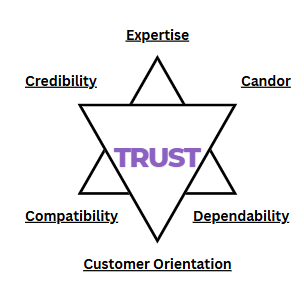
In this digital era, consumers are bombarded with advertisements, offers, and product information. One thing that can help brands cut through the clutter is trust. Long gone are the days of transactional selling; now, the focus is increasingly on trust-based relationship selling. Under this approach, you, as a seller, must provide consumers with accurate information—even if it comes at the cost of short-term loss. But what does trust even mean? Let’s dissect it!
What Does TRUST Mean?
Trust is the buyer’s confidence in the seller’s integrity. In sales, trust is a function of expertise, customer orientation, candor, credibility, compatibility, and dependability.
- Expertise: Does this seller have the required knowledge to support me in my buying decision?
- Customer Orientation: Will this seller suggest the best possible solution based on my needs?
- Candor: Is this seller honest with me throughout the sales process? (Shouldn’t overpromise or underpromise)
- Credibility: Can I trust the claims made by this seller? (Will the organization back their claims?)
- Compatibility: Do I enjoy engaging with this salesperson during the process?
- Dependability: Is this seller professional enough to carry out the sales process efficiently?
Breaking Down the Elements of TRUST
Expertise
A seller must have in-depth knowledge about the product/service, company, and industry. It plays a critical role in identifying customer needs and providing the best solution. This can be built by reading business magazines, company reports, and having conversations with consumers. Lack of expertise can instantly drive customers away. Many young sales personnel face this problem, but there are ways to overcome it:
(i) Shadow experienced sales managers. (ii) Prepare a list of potential customer queries and have answers ready.
Customer Orientation
A salesperson must work in the best interest of the customer to win trust and establish a long-term relationship. Sometimes, providing the best recommendations may mean losing out on business in the short term. However, in the long run, this practice ensures customer loyalty and trust in the salesperson’s recommendations.
Procter & Gamble provides insights to Walmart regarding their detergent section placement. They ensure that the recommendations benefit Walmart—even if that means P&G products are placed at the back. Here, P&G is not simply a supplier but has risen to the level of a strategic partner.
Candor
The biggest red flag in a salesperson is exaggerating product benefits and making false claims. This can lead to customer dissonance and legal implications for the organization. A salesperson must be genuine in their communication about product benefits and must also mention any limitations. There should be supporting explanations for these limitations as well.
For example, a customer may demand a specific feature from their SaaS provider, but if the provider does not offer this feature, they should neither falsely promise it nor suggest it can be added soon. Instead, the provider should inform the customer that the feature is not available yet but that they are working on it. They can further exhibit expertise by proving that the current offering is superior to market alternatives and fulfills the customer’s needs.
Credibility
A salesperson must deliver on their promises. Any commitments made should be backed by the organization; otherwise, failure to do so can result in lost sales and potential legal or financial implications for the company.
For instance, as an Area Sales Manager of a leading FMCG company, if you promise a distributor a quota discount for purchasing XYZ quantity but the company does not actually offer such a discount, the distributor has the right to sue the company for breach of contract.
Compatibility

A salesperson cannot simply start listing product benefits in the first meeting. Most people prefer to research product benefits online. Instead, they want to buy from someone they trust. This means that the customer must first get to know the seller. But knowing is not enough—they should also like the seller in order to engage in the sales process.
A salesperson must first bring the customer into their social circle before transitioning to persuasion. In the social circle, the seller helps customers fulfill their goals and aspirations (such as recognition, affiliation, or power). In the next phase, they leverage the positive rapport built to drive sales.
Dependability
A salesperson is expected to be highly professional. Any deviation can create doubts in the minds of customers. They must adhere to deadlines (e.g., delivery dates, proposal submissions, follow-ups). The salesperson must also demonstrate the ability to handle sensitive information responsibly. Buyers and sellers depend on each other to guard secrets carefully and keep information confidential.
Conclusion
Trust in sales is influenced by multiple factors. To be a trustworthy salesperson, one must excel in all these areas. Trust-based relationship selling not only helps in customer retention and repeat purchases but is an absolute necessity in today’s digital world.
Subscribe to our blog to stay updated on the latest marketing strategies, industry trends, and expert insights to fuel your business growth! 🚀 Have any topics in mind? Drop a comment below and let us know what you’d love to see next!
Best Digital Marketing Campaign: Oreo’s Winning Strategy
Did the words “Twist, Lick and Dunk” ring a bell? You guessed it right! We’re…
group3.digitalmarketing1@gmail.com
Vanshika is a high-achieving student who is currently in her second year of the Integrated Program in Management (IPM) at IIM Jammu. Presently, Vanshika interns at Bharat Heavy Electricals Limited (BHEL), and earlier interned with Hindustan Unilever Limited (HUL) where she got substantial experience in project management. Before that, she honed her skills in digital marketing as an E-commerce and SEO Intern with Women Entrepreneurs India. She participates actively within the IIM Jammu community as a Student Coordinator for Anandam, Centre of Happiness and Toastmasters Club. The outstanding talent possessed by this young lady was acknowledged when she received the Reliance Foundation Undergraduate Scholar award.
